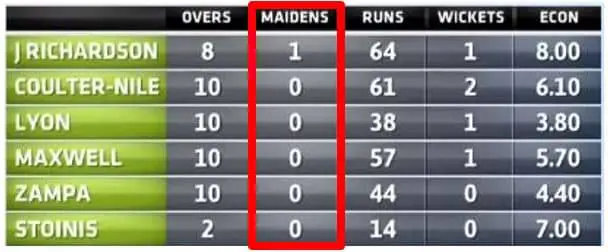You will see and hear the word ‘maiden’ being used a lot if you watch cricket! It’s a term that is used by most commentators as well as statisticians in order to help tell the story of what is happening in the game. Therefore, it is a word that needs to be understood properly! Luckily for all of us, the explanation is rather simple…
A maiden (in the context of cricket) refers to any over that is bowled by the bowler that results in zero runs being added to the batting teams run total. This is why you will often hear it being referred to as a ‘maiden over’! The over must consist of 6 legal deliveries. If an illegal delivery (such as a wide or a no ball) is bowled, a penalty run will be added to the batting teams total, meaning the over cannot be classed as a maiden. However, an over can still be classed as a maiden if the only runs that the batting side score are as a result of byes or leg byes. Byes and leg byes do not count against the bowler; therefore, they cannot ruin a maiden over!
Bowling maidens are a great way of putting pressure on the batting team. All batsmen like to see their scores ticking along at a nice rate, so if bowlers can stop them scoring runs for a prolonged period of time, they are more likely to become frustrated and take risks in order to score. I’ve listened to a lot of Shane Warne commentary over the years, and he has spoken a lot about the importance of bowling maiden overs. The famous Australian team that he represented believed that if you could bowl 5 maidens in a row during a test match, it dramatically increased their chances of taking wickets!
Maiden overs are more common in longer formats of cricket, where there is not as much pressure on the batsmen to score at a fast rate. In limited overs matches such as T20’s or ODI’s, batsmen will often need to score at much higher rates, usually more than 6 runs per over! This means they will take more risks to score runs faster, leading to less maidens being bowled in these forms of the game.
If you’re watching on TV, you will usually see how many maidens have been bowled by each individual bowler when the bowling statistics for the innings are shown. This will look something like the photo below! The column showing the maidens is highlighted by the red box! You can see that in this innings only one bowler managed to bowl a maiden over for Australia.

What Is A Wicket Maiden?
You may be able to guess the answer to this one just by reading the name! A wicket maiden is an over bowled by the bowler in which they concede no runs, but also manage to take one or more wickets! The rules regarding no balls and wides, as well as byes and leg byes that I mentioned in the previous section also apply to wicket maidens.
In limited overs matches such as T20’s or ODI’s, wicket maidens are a bowler’s dream! They’re even more special when they occur towards the end of the batting innings, when there is more pressure on the batsmen to pick up runs. When a bowler is able to take a wicket, it increases the chances that they will bowl a maiden over. This is due to the fact that the new batsman will usually need a bit of time to adjust to the game situation, the pace of the bowling, and the pitch.
Who Has Bowled The Most Maidens Ever In Cricket?
Muttiah Muralitharan bowled the most maidens ever over the course of a single playing career, amassing a whopping 1992 maiden overs across all forms of the game.
In terms of a single game, the player responsible for the most maidens bowled during one innings of a test match was Alf Valentine of the West Indies. He bowled a total of 92 overs, 49 of which were maidens! In ODI cricket, the record for highest number of maidens during one innings is 8, and this record is held by two bowlers; Bishan Singh Bedi of India and Phil Simmons of the West Indies. It should be noted however, that Bedi achieved 8 maidens out of a total of 12 overs bowled, whereas Simmons bowled just 10 overs! The T20I record for most maidens in an innings is 2, and this number has been achieved by numerous bowlers, including Sulieman Benn, Shaun Tait, Graeme Swann, Harbhajan Singh, Bhuvneshwar Kumar and many more.
